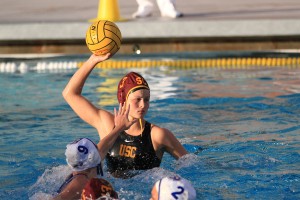Haralabidis twins are making a splash
Since the age of 12, Ioanna and Stephania Haralabidis have been terrorizing opponents on the water polo scene. Before the freshman drivers arrived on the defending national champion USC women’s water polo team, these twin sisters — hailing from Athens, Greece — have created havoc at many different levels of competition. But water polo was not always the target sport for the twins, and without an incredible influence the dynamic duo may never have had the chance to embrace their terrific talents.

Switch it up · Freshman driver Ioanna Haralabidis says she and her twin sister wouldn’t be succeeding at USC if not for the help from their mother, who supported them in switching from swimming to water polo. – Corey Marquetti | Daily Trojan
Though they didn’t get involved with water polo until they were 12, the Haralabidis twins were far from strangers to the pool. Throughout more than eight and a half years swimming, the sisters found their strokes — Ioanna with butterfly and Stephania with backstroke — and excelled in competition.
“We were always first, second place. We were really, really fast swimmers,” said Stephania, the younger of the two by about a minute. “We were going to be on the senior national swimming team, but we never really liked swimming. Going to practices we would cry to our mom, ‘We don’t want to go! We don’t want to go! We don’t like swimming!’ And then one day my older sister was like, ‘Mom, I’m done with swimming. I don’t like it anymore.’ And she was like, ‘OK. Let’s try another sport.’”
Ioanna — called Joe by her sister and teammates — was not surprised by her mom’s reaction.
“We always whined, but my sister never whined,” said Ioanna about her 20-year-old sister, Anastasia. “She liked the practices, so suddenly when she didn’t like it, my mom said it was enough so we went to water polo.”
After playing for years, Anastasia decided to forego the student-athlete process and currently attends the University of Prince Edward Island in Canada.
As big an influence as their older sister was, both Ioanna and Stephania singled out their role model without any hesitation: their mother, Janet Scott.
“She is so amazing. I don’t know what I would do without her,” Ioanna said. “I wouldn’t be here without her. She did everything to make us be here.”
Stephania mirrored her sister’s admiration for their mother.
“We wouldn’t have gone so far in our career with water polo because of her and wouldn’t have accomplished so many things without her,” Stephania said. “I have never met such a person that has done such great things for other people and doesn’t want anything for [herself].”
Scott now lives in Canada, and though she hasn’t seen her girls play at the collegiate level yet, she plans on attending the Mountain Pacific Sports Federation and NCAA tournaments.
Reinforced by their mother’s dedication, which included chauffering the phenom freshmen from tutoring to school to practice each day, both of the standouts found their path onto the national stage. As members of the Greek Junior National team, the two claimed gold medals at the Junior European Championships in both 2011 and 2012 before capturing bronze as a part of the Women’s Senior World Championship team in China in 2012.
“The first time I felt I was going somewhere with water polo is when I was on the national team,” said Stephania, who is USC’s second-leading scorer this season. “When we were 16, we won first place in the championship in Spain, and I won MVP in that championship … I just felt like, ‘Now I am going somewhere. Now I am going to have some accomplishments in this sport, and I can look in the future with greatness in this sport.’ It was just a big moment in my life.”
Constantly bombarded with school and sport, every student-athlete has his or her own mechanism to relieve stress. Though they are similar in many ways, Ioanna and Stephania see this as their biggest difference.
“She loves going out. I like going up to new people and talking to them, while she is more shy toward them, but she likes socializing a lot more — going out with her friends,” Ioanna said of her sister. “I like mostly just relaxing and maybe just [reading]my book, or something.”
When they’re not working out in the pool, the twins enjoy watching TV in their shared dorm.
“I love watching crime shows, like the killing and how to solve it,” said Stephania, the agreed-upon messier of the two. “Dexter, romance, comedy, I watch everything. Except for thrillers. They scare me so much.”
Despite the variety of teams played for and people they have encountered, the sisters are still looking for the right nickname to catch on.
“Our coach, mostly everyone that we met, they called us the bullets,” Ioanna said. “Especially here, they use these a lot. ‘Hey, Greeks. Hey, twins.’”
The twins have certainly earned their nicknames as the bullets. Stephania has scored 43 goals in USC’s 22 games this season, while Ioanna has scored 26. But their teammates also have a more affectionate nickname for the tandem.
“They call us Joe-Seph because of Joe and Steph, they combine the two names, but I’m not sure,” Stephania said. “I’m not good with that stuff.”
Helping to guide the Women of Troy to a 21-1 record in their first season at USC is an impressive feat, but the sisters’ sights are set on retaining the title of National Champions. Admitting that an Olympic medal (which they hope to attain in the 2016 Summer Olympics) may slightly top the NCAA championship in significance, both agree that an NCAA title would be an incredible achievement in their first year at USC.

